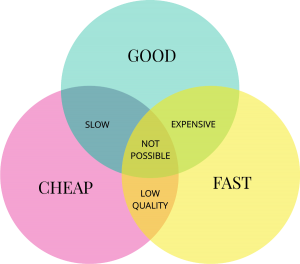One bad customer service experience can tarnish customers’ opinion of a product or a brand indefinitely. But one exceptional experience, on the other hand, can them into loyal brand advocates.
So, how can brands actually earn the loyalty of customers? To answer this question, we’ve curated a list of B2B and B2C brands that are established as industry leaders — and that deliver exceptional customer service. But, before we dive into those examples, we need to set a baseline for what “good” customer service is.

In addition to the ones listed above, let’s break down the six most common characteristics of good customer service teams.
1. Rapid Response Times
Customers are always looking for fast solutions. In fact, 66% of adults say that the most important thing a company can do is value their time. This means your team needs to focus on efficiency and develop a workflow that streamlines different support functions. Consider adopting a help desk tool to manage and automate a variety of service tasks.
2. Customer Feedback Collection and Analysis
Since customer needs vary from industry to industry, good customer service looks different depending on the type of business you’re running. The best customer service teams use feedback collection tools to identify the specific needs of their customer base and create personalized solutions for them.
Rather than assuming you know what your customers want, reach out to them through surveys and interviews to get their perspective on your business. These tools will help your team uncover new opportunities to enhance your products and improve the customer experience.
3. Customer Self-Service
When your customers want to find their own solutions to service problems, they should use self-service resources provided by your business. For example, one of the most common self-service resources is a knowledge base.
Knowledge bases consist of categorized support articles and FAQ pages that supply customers with solutions to common user roadblocks. With more customers wanting to solve problems on their own, self-service tools like these are assets when providing high-quality customer service.
4. Omni-Channel Support
It should be easy for customers to contact your support team, regardless of the medium they’re using. Your team should be equipped to respond to incoming service requests via phone, email, social media, live chat, and any other communication channel that your customers prefer. Providing this type of omnichannel experience makes your team more accessible and creates less stressful service interactions.
5. Emotional Intelligence
Emotional intelligence refers to your ability to read and react to other people’s emotions. This skill is highly valuable in customer service roles because it helps with diffusing difficult customer interactions. Every business experiences a frustrated or upset customer, but the best service teams are able to de-escalate the situation and prevent potential churn. In fact, avoidable churn represents $35.3 billion.
6. Creative Problem Solving
At the end of the day, the best customer service teams solve their customers’ problems. They’re tenacious and determined to help their customers achieve their goals. In many cases, this requires agents to be creative and come up with unique solutions to customer issues. As you’ll see in the examples below, sometimes excellent customer service means finding a solution that falls outside of normal company protocol.
 Laptop,Business Laptop,Gaming Laptop,Laptop Provider in India Laptop,Business Laptop,Gaming Laptop,Laptop Provider in India
Laptop,Business Laptop,Gaming Laptop,Laptop Provider in India Laptop,Business Laptop,Gaming Laptop,Laptop Provider in India